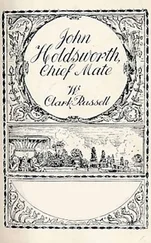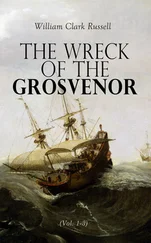As to the pilot, he was ungetatable. Moreover, his language was so clouded with marine expletives that his lightest answer was generally a shock to the sensibilities.
Every boatman from Margate to Penzance calls himself a pilot nowadays; but the genuine pilot—such a man as this who was taking the “Meteor” down Channel—stands out upon the marine canvas with an individuality that makes him unique among seafaring human kind. Figure a square, bow-legged man, in a suit of heavy pilot cloth, a red shawl round his neck, a tall hat on his head, a throat the colour of an uncooked beefsteak, and a face of a complexion like new mahogany, small moist rolling eyes, a voice resembling the tones of a man with the bronchitis calling through a tin trumpet, and an undying affection for Jamaica rum. Such was Mr. Dumling, the “Meteor’s” pilot, a man to whom the gaunt sea-battered posts, the tall skeleton buoys, the fat wallowing beacons, and the endless variety of lights ashore and at sea, from the North Foreland to the Land’s End, were as familiar and intelligible as the alphabet is to you; who was so profoundly acquainted with the Channel that he boasted his power to tell you within a quarter of a mile of where he was, by the mere faculty of smell! A man who could look over a ship’s side and say, “Here are four fathoms of water, and yonder are nine,” “And where the shadow of the cloud rests the water is twelve fathoms deep;” and so on, every inch of the road, for miles and miles—a miracle of memory! To appreciate the value of such a man you should be with him in the Channel in a pitch-dark night, blowing great guns from the north-east, with the roar of the Goodwin on the lee bow, and a sea so heavy that every blow the ship receives communicates the impression that she has struck the ground, while the black air is hoarse with the gale and fogged with stinging spray.
The wind is nowhere more capricious than in the English Channel. At one o’clock the spanking breeze swept round to the south-east; the watch went to work at the braces; up went the foretopmast-stun’sail, and the “Meteor” rushed ahead at twelve knots an hour.
“We shall be off Plymouth at eight o’clock,” says the pilot, and went below to lunch with a serene face.
He was right. At eight o’clock the “Meteor” was lying with her main yards backed, dipping her nose in a lively sea, with a signal for a boat streaming at her mast-head.
The passengers might take their last look at old England then, whilst the glorious sunset bathed the land in gold, and made the wooded shores beautiful with colour and shadow. And now, dancing over the waters, came a white sail, which dimmed slowly into an ashen hue as the crimson in the skies faded and the waters darkened.
“Any letters for shore?” says Captain Steel, moving among the passengers, and soon his hand grows full. Many of the men come forward and deliver missives for the wife, for Sue, for Poll, to the skipper, who gives them to the pilot. The boat, glistening with the sea-water she has shipped, sweeps alongside, ducks her sail, and is brought up by a line flung from the main chains.
“Good-bye, cap’n,” says the gruff pilot; “wish you a pleasant voyage, I’m sure, gen’l’men and ladies;” drops into the main chains, and from the main chains drops into the boat; the sail is hoisted, a hat waved, a cheer given from the ship’s forecastle, and away bounds the lugger in a cloud of spray.
Now bawls Captain Steel from the break of the poop; round swing the main yards; the noble ship heels over, trembles, and starts forward, and, with the expiring gleam of the sunset upon her highest sails, the “Meteor” heads for the broad Atlantic, and glides into the gloom and space of the infinite, windy night.
CHAPTER IV. – IN THE ATLANTIC.
There were eight passengers and twenty-seven hands, counting captain and officers, on board the “Meteor;” in all, thirty-five souls.
In these days half that number of men would be thought ample to handle a ship of eleven hundred tons. Taking fourteen men as a ship’s company, we find—one, the cook, who is useless aloft; five ordinary seamen, equal to two able-bodied men; four ill and unable to leave their bunks; the remainder consist of the captain, two mates, and the carpenter. So that a summons for all hands to shorten sail, for example, brings forth about enough men to do the work of one yard—one yard, when there are twelve, exclusive of trysails, jibs, stun’sails, spanker, and staysails. This modern system of undermanning ships is an evil next in magnitude to that of sending crazy and leaky vessels to sea; and as many ships are lost for want of hands to work them on occasions which demand promptitude and muscle, as are lost by rotten planks and overcharged cargoes.
The passengers on board the “Meteor” consisted of four gentlemen, two ladies, a little boy, and a female servant. Of the gentlemen, one was a young man named Holland, who was going to America for no other purpose than to see Niagara; another was a merchant, who was to represent a London house in New York. He was accompanied by his wife and her maid. The third was a General in the United States Army, a fine old man with a chivalrous courtesy of manner and a handsome honest face, who had been picking up what professional hints he could find by a year’s sojourn in the military depôts of Great Britain. The fourth male passenger was an actor, magnificently named Gerald Fitzmaurice St. Aubyn, in quest of more appreciative audiences in the New Country than his genius had encountered in the Old. The widow and her son completed the list.
It took these good people a very short time to settle down to their new life and adjust themselves to the novel conditions of existence that surrounded them. The ladies lay hidden at the first going off; and, although Mr. St. Aubyn put in a punctual appearance at meals and smoked a great quantity of cheroots, it must be admitted that he was peculiarly pensive for a comedian, whose genius, he affirmed, was chiefly at home in genteel farce, though he had enacted tragedy with applause.
The “Meteor” met with adverse winds, but brilliant weather, during the first few days. She tacked north and south, and crowded canvas to make headway, but, though her speed was great through the water, her actual progress was small.
“No matter,” said Captain Steel, patiently; “we may get a gale astern of us some of these hours, and then we’ll make up for lost time.”
But whilst the weather remained so beautiful, the wind brisk and the sea smooth, the passengers could hardly regret the delay. It was like yacht sailing—dry decks, steady motion, and always the pleasurable sense of swiftness inspired by the beaded foam crisping by and stretching like a tape astern. Now and again they signalled a ship homeward bound or journeying south. The widow’s little boy clapped his hands to see the bright flags flying at the mizzen-peak, and the ladies were lost in wonderment to think that those gay colours were a language as intelligible to those concerned in their interpretation as “How do you do?” and “Very well, thank you.”
The “Meteor” had a snug cuddy; and a hospitable sight was the dinner-table, with the white cloth covering the long board, the gleaming silver and glass, the fine claret jug (testimonial by former passengers to the captain), the colours of wines in decanters, the grinning negro always colliding with the steward, and the skipper’s rubicund face, relieved by soft white hair, at the head of the table, backed by the polished mizzen-mast. Overhead was the skylight, through which you might see the great sails towering to the heavens; and over the dinner table swung a globe of gold-fish between two baskets of ferns. There was a piano lashed abaft the mizzen-mast; and all around the cuddy were the cabins occupied by the passengers, the captain, the mates, with highly-varnished doors and white panels relieved with edgings of gold.
Читать дальше












